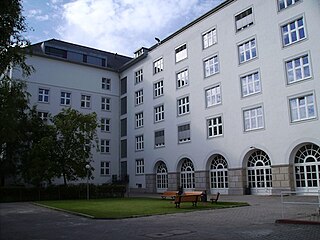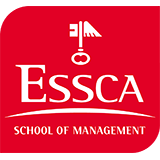The Aalto University School of Business, is the largest business school in Finland. Founded in 1911, it is the second oldest business school in Finland and one of the oldest business schools in the Nordic countries. The school became part of Aalto University on 1 January 2010. It has been previously known as the Helsinki School of Economics, the Helsinki School of Economics and Business Administration, and during 2010-2012 the Aalto University School of Economics.

The Erasmus Programme is a European Union (EU) student exchange programme established in 1987. Erasmus+, or Erasmus Plus, is the new programme combining all the EU's current schemes for education, training, youth and sport, which was started in January 2014.
The Norwegian School of Economics or NHH is a business school situated in Bergen, Norway. It was founded in 1936 as Norway's first business school and is a leading teaching and research institution in the fields of economics and business administration.

Erasmus University Rotterdam is a public research university located in Rotterdam, Netherlands. The university is named after Desiderius Erasmus Roterodamus, a 15th-century humanist and theologian.
Rotterdam School of Management, Erasmus University is the international business school of the Erasmus University Rotterdam located in Rotterdam, Netherlands. RSM offers undergraduate and postgraduate programmes taught mostly in English, including MBA, executive education, and PhD programmes.

The International Institute of Social Studies (ISS) of Erasmus University Rotterdam is an independent and international graduate school of policy-oriented critical social science. ISS was established in 1952 by Dutch universities and the Netherlands Ministry of Education. The institution is located in Netherlands, The Hague, also known as 'The World's Legal Capital'.

A public policy school is typically a university program that teaches students policy analysis, policy studies, public policy, political economy, urban planning, public administration, international relations, security studies, political science, urban studies, intelligence studies, global studies, emergency management, public affairs and/or public management. Public policy schools typically train students in two streams. The more practical stream treats the master's degree as a terminal degree, which trains students to work as policy analysts or practitioners in governments, government relations, think tanks, and consulting firms. A more theoretical stream aims to train students who are aiming to go on to complete doctoral studies, with the goal of becoming professors of public policy, political science in general, or researchers.

The European School of Economics (ESE) is a private college of higher education. It is accredited by ASIC, validated by Richmond, The American International University in London, and is an officially approved Learning Provider. ESE offers UK bachelor's degree, master's degree, MBA, and specialised short programmes at its centres in London, Rome, Milan, Florence, and Madrid.

The University of Economics – Varna is a public university located in Varna, Bulgaria, focused on studies in the field of economics. The University has an accreditation issued by the National Evaluation and Accreditation Agency.

The Berlin School of Economics and Law, abbreviated as BSEL, is a public institution of higher education and research founded on 1 April 2009 through the merger of the Berlin School of Economics (BSE) and the FHVR Berlin. The BSEL portfolio provides a wide range of Bachelor's and Master's programmes in fields such as business, administration for the public and private sector, public security, law, or engineering. BSEL has an international approach with close working relationships to over 150 partner universities all over the world.
The European Union's Erasmus Mundus programme aims to enhance quality in higher education through scholarships and academic co-operation between the EU and the rest of the world. The three main objectives of the programme are linked to the internationalisation of students, staff, curricula and research; ensure an influence on the development of practice in Special Education Needs and inclusive education; and to develop international collaborative networks, projects and research.
The Higher Education European Masters is an Erasmus Mundus program which focuses on the functions, policies, and operations of higher education. Professor Peter Maassen, a professor at the University of Oslo and also a research professor at NIFU-STEP, was instrumental in the conceptualisation of the programme. The program was among the first to acquire an Erasmus Mundus European Masters label of the European Union in 2004.
Master of Corporate Communication (MCC), or Master of Science in Corporate Communication (MSc.CC), is a post-graduate master's degree designed to prepare communication professionals who in time will function as Corporate Communication Officer (CCO) at a strategic level in the organization. The MCC program structure and admissions are similar to that of the Master of Business Administration and Master of Science in Management degrees. The equivalent of MCC at some universities is Master's in Communication, Master in Public Relations, Master in Communication Management.

Kozminski University is a private, non profit business school in Warsaw, Poland, and is considered to be "Poland’s highest rated private university". It was established in 1993 and named after Leon Koźmiński, a Polish professor of economics and entrepreneurship, and also the father of Andrzej Koźmiński, the founder and the first rector of the school. It is one of the top business schools in the world, contains the Central Eastern campus of ESCP as of 2015, and the only institution of higher education in Poland, holding the "triple accreditation ". Less than 1% of business education providers worldwide hold these three major international quality accreditations. The Financial Times named the university as the best business school in Poland and Central Europe.

The Institut Barcelona d'Estudis Internacionals (IBEI) is an interuniversity research institute and postgraduate education center located in Barcelona, established in 2004 as a joint initiative between the Barcelona Centre for International Affairs and five universities in the Barcelona metropolitan area, as a center of excellence in international studies. The President of the Institute is Narcís Serra, former Minister of Defense and former Vice President of Spain, and the Director is Jacint Jordana, Professor of Political Science at the Pompeu Fabra University.

ESSCA School of Management is a French grande école and business school. Historically based in Angers, it now has campuses in Paris, Aix-en-Provence, Lyon, Bordeaux, Cholet, Budapest and Shanghai.

The Faculty of Social Sciences (FSS) is one of the newest faculties of Charles University. The Faculty was founded in 1990, shortly after the Velvet Revolution. It soon became a regional centre of teaching and research in area studies, economics, international relations, journalism, media studies, sociology and political science. The Faculty offers bachelor’s, master’s, and doctoral degree programs in social sciences. While the languages of instruction are Czech and English, students can choose from classes in a wide range of other languages, including French, German, Russian and Spanish.
The European Joint Master degree in Economics provides a rigorous education in fundamental quantitative tools by combining economic theory with related quantitative disciplines such as Econometrics, Finance, Actuarial Science, Probability, Statistics, Mathematical Modeling, Computation and Simulation, Experimental Design, and Political Science, managed by consortia of higher education institutions from the European Union.
The Department of Public Policy, formerly School of Public Policy (SPP) at Central European University (CEU) is an English-language graduate institution with campuses in Budapest and Vienna. CEU was founded by philanthropist George Soros.

WSB University is a state-recognized private university, located in Dąbrowa Górnicza in Poland. It educates students, conducts research and co-operates to develop the economy. The university enrolls about 8 000 students supported by 200 employees.











